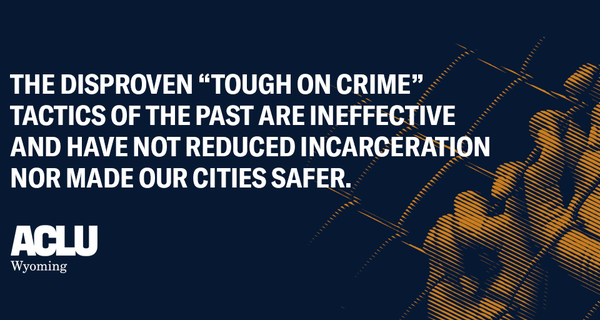This piece originally appeared on the WyoFile website on November 28, 2017.
There are more people behind bars or under the supervision of the criminal justice system in Wyoming than live in the entire city of Jackson. For a starker comparison, the population size of our criminal justice system is bigger than that of eight Wyoming counties. This is a problem, and it is one we cannot continue to wait to address.
The trend toward more crimes, longer prison sentences, and higher fines is not unique to Wyoming. Throughout the 1980s and 1990s the entire country was ‘tough on crime,’ with the (mistaken) belief that being so would make our cities and towns safer. But those policies failed, and most states by now have moved away from ‘tough on crime’ laws and toward criminal justice reforms, decreasing prison populations and funding prevention programs. What is unique to Wyoming is not that we once bought into ‘tough on crime’ laws. It is that we still do.
The impact this is having on our criminal justice system and our state budget is significant; even more significant is the impact putting so many Wyoming citizens behind bars has on our families and our communities. Our prisons are full, our probation and parole supervisors are overworked, our courts are packed, and the budget cuts experienced by the Department of Corrections and local governments make it impossible to keep up with the number of people our laws dictate we put behind bars. And while all this is happening, families and communities have members taken away, often incarcerated without the kind of rehabilitation support that will make their return successful and productive.
This problem is not without cause. Over the course of the past four years alone, the Wyoming Legislature has passed 70 bills establishing a new crime or increasing the penalty for a crime already in state law. That is 70 new crimes or increased penalties putting Wyoming citizens behind bars or under the supervision of the state in just four years; look back 10, and the number is even starker.
To understand how this happened, we need look no further than the mid-November meeting of the Joint Interim Judiciary Committee. The 14 members of the committee met in Wheatland to discuss several pieces of legislation, many of which dealt with crimes, penalties, and probation and parole programs. Several bills addressed crimes of domestic violence, including stalking and strangulation. These are horrendous crimes, to be sure, crimes that surely need to be comprehensively addressed to protect victims and potential victims.
What came out in testimony in Wheatland, however, is that no one, not even advocates for longer prison sentences and harsher penalties, thought the bill would deter perpetrators of violence. To put it more clearly, the proposed new penalties will not protect victims of domestic violence and they will not prevent acts of domestic violence from happening in the future.
This reality begs the question of what the purpose of such legislation is, if not the prevention of crime and the protection of victims.
Bills dealing with crimes of domestic violence aren’t the only ones that raise this question. Many, if not most, bills proposing new crimes or increasing penalties fail to deter the behavior the legislation is meant to address. Establishing a felony with a 10 year prison sentence for fleeing police will not reduce the number of people running from the cops. It is punitive punishment, plain and simple. It is the government telling the governed, we don’t like what you did, and we’re going to punish you for it as long and as hard as we can.
These trends also cannot be examined without looking at the disparate impact our laws have on people of color in Wyoming. Black people make up only 1.4 percent of the state’s population, but over 5.5 percent of the state prison population and over 22 percent of the state’s local jail population. Native Americans also are incarcerated at significantly higher rates than their white counterparts; while making up 2.7 percent of the state’s population, they are over 6 percent of the people in state prisons and 8 percent of local jails.
For a state that prides itself on equality, small government, and a proud and independent people, this is unconscionable. We cannot continue to pretend there are not issues with our criminal justice system, and with the laws that keep putting people behind bars.
It is time to reign in the government forces that continue to put more and more people under government supervision for crimes that can be dealt with more effectively, and at a lower cost to society, in other ways.



